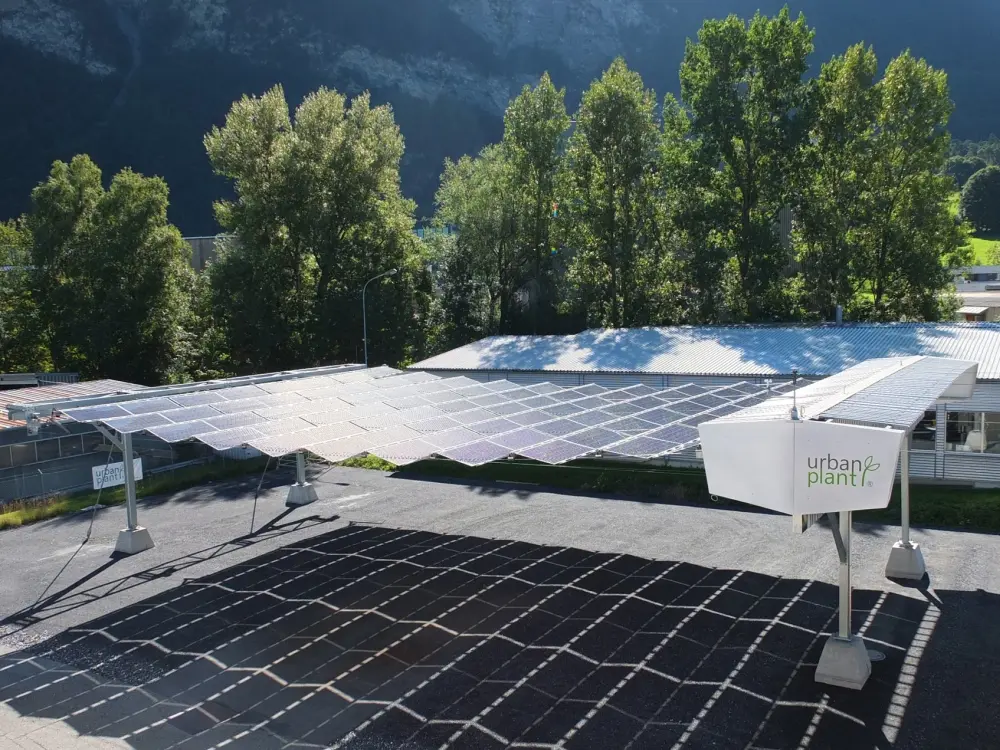Project: Urban Plant
Foldable solar panels that move with the weather
Urban Plant is a foldable solar panel system jointly developed by the ZHAW and Light Energy Systems AG. The advantage of this system is that it automatically moves the solar panels into a protective box when the weather turns bad. The intelligent control mechanism on which the system is based is the result of an excellent bachelor degree thesis written by two Electrical Engineering graduates at the ZHAW School of Engineering.
The materials used in solar panels now account for only about half of the overall costs of a photovoltaic installation. Roughly a third of the total cost goes on the mountings on which they rest and the assembly of the modules. Thus, in addition to cheaper solar panels, the economic viability of solar-energy installations also critically depends on new construction concepts. The innovative approach taken by Light Energy Systems AG involves using light-frame construction techniques for the solar panels and protecting them from adverse weather conditions. When necessary, the Urban Plant system moves the solar panels into a protective box, thus shielding them from wind and weather damage.
“Instead of being built to withstand all weather conditions, the modules used in the Urban Plant system are transported into a protective box when necessary.”
Professor Franz Baumgartner, Institute of Energy Systems and Fluid Engineering
Light-frame construction reduces material costs

A first functioning prototype has already been in operation for several months in Balzers in Liechtenstein. Because the construction method allows stability to be achieved with less material, these panels are cheaper than their conventional counterparts. “All rigidly mounted panels have to be ready to withstand a worst-case scenario, which means they have to have a high degree of stability,” explains Franz Baumgartner, who teaches Photovoltaics at the Institute of Energy Systems and Fluid Engineering (IEFE). “Instead of being built to withstand all weathers, the Urban Plant modules are transported into a secure box when they need to be protected.” This approach saves tons of concrete, steel and glass. The solar-panel roof also provides shade. According to Baumgartner, the foundations for an installation of this kind require only one tenth of the concrete which would be used by a fixed solar-panel installation of comparable size. Calculations made on the prototype also show that stowing the panels away when weather conditions require only reduces the annual solar energy yield by between one and three percent.
Intelligent, weather-dependent control
Urban Plant is the world’s first weather-driven solar-panel system destined to be installed above parking lots. When the sun is shining the solar roof unfolds to create an area of several hundred square metres and produces electricity. If storms, hail or snow are imminent, the modules automatically disappear into the main rigid section of the installation. This is made possible by an intelligent control system which monitors a number of weather metrics to determine when the foldable solar panels need to be stowed away for protection. The system was developed by two Electrical Engineering graduates, Thomas Baumann and Matthias Ott, for their bachelor degree thesis at the IEFE. A small weather station is attached to the roof of the installation. This measures changes in wind speeds during a given period of time. It also monitors air temperature, humidity and atmospheric pressure. These readings give an indication of how the weather will evolve in the near term. “If, for example, a thunderstorm is imminent, this is immediately indicated by changes in air humidity and temperature,” explains Thomas Baumann. “That keeps us a step ahead of the weather, because we can already predict wind squalls before they happen.” The command to stow away the roof is given automatically. Within a minute all the solar panels are safely stored in their protective boxes.
“That keeps us a step ahead of the weather, because we can already predict wind squalls before they happen.”
Thomas Baumann, Electrical Engineering graduate, ZHAW School of Engineering
At a glance
Participating institutes and centres
Project partners:
- Light Energy Systems AG
Participating Bachelor Degree Programmes:
Financing: support by Light Energy Systems AG
Project status: completed